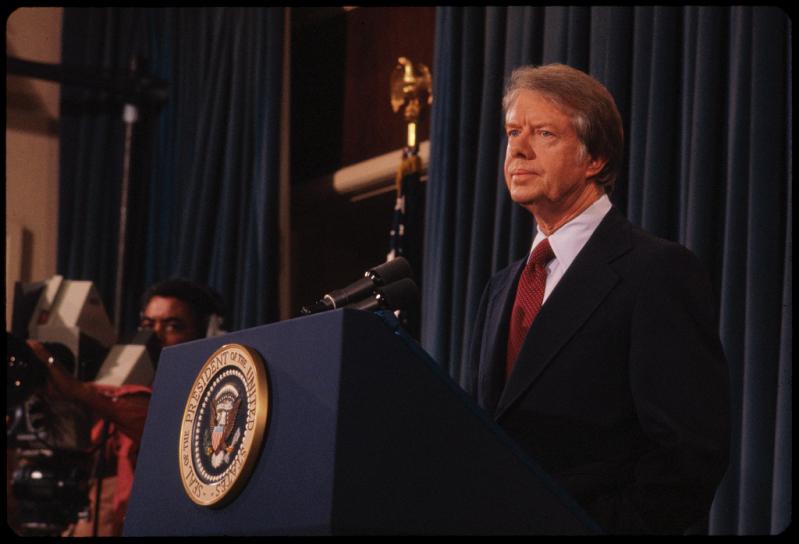Early into his presidency, on Feb. 2, 1977, Jimmy Carter addressed the nation wearing a cardigan sweater beside a crackling fire. With an energy shortage looming, he called on his fellow Americans to turn their thermostats down to 55 degrees at night and to reflect upon their consumption: “The amount of energy being wasted which could be saved is greater than the total energy that we are importing from foreign countries.”
Sometimes I like to pause and consider what might have happened had this message come off as more than grim and irritating. I imagine if the L.I.E. allowed only silent, high-speed trams; I imagine a wintry park reclaimed from an oversize parking lot. Then the light turns green, and I look over at the long line of cars idling in the Starbucks drive-through.
As New York City heads out of another record warm February, with five days in the 60s, Carter’s prescience is only slightly less stunning than our continued ability to ignore it. Back then, nearly 50 years ago, with roughly half the global population, he said, “We must face the fact that the energy shortage is permanent. There is no way we can solve it quickly.” And then he said, “But if we all cooperate and make modest sacrifices, if we learn to live thriftily and remember the importance of helping our neighbors, then we can find ways to adjust.” He used the word “sacrifices.”
Two weeks before this speech, I was standing on a cold, windy street corner in Washington, D.C., taking refuge by my father’s knees on Inauguration Day. One of my earliest memories is the glimpse of President Carter’s motorcade, the long line of long black vehicles draped in American flags. Even then, I was conscious of being eyewitness to the most important event happening in the world. I could not then appreciate how he would ask his fellow citizens to summon their introspection: “We have learned that ‘more’ is not necessarily ‘better.’ “ But I could feel the swell of collective unity, the sun shining brightly on all of us through the crisp, clear air. “Let no one confuse our idealism with weakness,” he said.
As his soul moves beyond that ranch house in Plains, Ga. — where he has entered hospice care — to that place reserved for a president-turned-Sunday-school-teacher, we are also fighting the death of his spirit. He stretched the American psyche, calling on us to think of ourselves as members of a national community. He grew the national park system, created the Department of Education, strengthened the Social Security system, and appointed record numbers of women, Black people, and Latinos to government jobs. He put solar panels on the roof of the White House; months later, a few of my neighbors had put them up as well.
Even so, the 30-second sound bite of his presidency will feature energy and hostage crises, inflation, and recession. But he thought of Americans as capable of more than sound bite levels of thinking. He didn’t just identify a problem; he asked for us to participate in its response.
On July 5, 1979, truckers and residents of the usually quiet Levittown, Pa., set bonfires to protest the inflated cost and scarcity of gas, complicated by unrest in the Middle East. Carter cut short his vacation, gathered civic and political leaders at Camp David, and diagnosed that the nation was ailing from a wounded heart — more than just an energy crisis, but a crisis of spirit.
Ten days after the riot, he spoke frankly from the Oval Office: “Too many of us now tend to worship self-indulgence and consumption. Human identity is no longer defined by what one does, but by what one owns.” He said that it was “fragmentation and self-interest” that prevented Americans from tackling the energy crisis. This has come to be called the “Malaise Speech.” But Carter did not make it to simply lay a sickness upon the American table; he was asking us to actually do something about it, to bear responsibility.
Did Americans secretly want to hear that material goods “cannot fill the emptiness of lives which have no confidence or purpose”? Were they, by that point, tired of staring blankly into the pull tabs of their Coors? Perhaps. The speech worked. Carter received an 11-point bump in his poll numbers, my neighbors boasted about their solar panels, and one man wrote to the president, “Last month I purchased a moped to drive to work with. I plan to use it as much as possible, and by doing so I have cut my gas consumption by 75 percent.”
It didn’t stick. In “The Age of Reagan,” Sean Wilentz writes of the “loser” president “abdicating his role as leader and blaming the people themselves for their own afflictions.” So, rather than finding sweaters to wear in the house, and heading out to the compost bin, we sat back down and turned to words that sounded an awful lot easier. “I find no national malaise,” Reagan said when he announced his candidacy. And soon enough, he took down the White House solar panels and led people to the chairlift, to where they could see that America stood like a “shining city on a hill.”
How would Carter contend with American exceptionalism today? How might he summon our reflective energies about consumption and waste, flooding and drought, sea level rise and screen time, obesity and pharmaceuticals? Would he prevail upon our common humanity to do what we had to do and sometimes to do it better than we thought we could? And would we be willing to slow down and think about what really matters in our lives?
President Carter made the unforgivable error of treating the American people like adults. Will any president ever do this again?
Tim Donahue has a house on Napeague. He teaches high school English in New York City and writes about climate change, education, and endurance sports.

